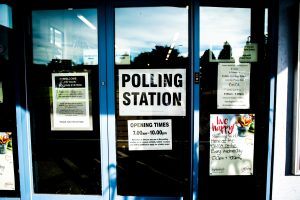Want to Help Solve Elections and Facebook? Switch the Default to Transparent Advertising Online
Today more than ever, elections are won and lost on social media. With people practicing social distancing and staying at home, political campaigning around the world is taking place primarily on Facebook, YouTube, Twitter and other social media platforms. Not only will social media be decisive in the upcoming elections in the United States, but also in Myanmar – where Facebook was used to incite hatred and violence against the Rohingya minority.
While social media can be a great platform for voter mobilisation and civic education campaigns, online political campaigning also entails risks to electoral integrity. Broadcast or newspaper political campaigning is publicly available to the whole population and subjected to strict requirements, but there is no such public scrutiny for online ads. On social media, advertisers choose their own audience and micro-target these homogenous groups with very specific messages, segmenting the population and further polarising people with incomplete information that reinforces their own views.
While social media can be a great platform for voter mobilisation and civic educationAccountability within the public education system is key to improving outcomes and attainment, and accountability is nearly impossible without transparent policies and opportunities for participation ... campaigns, online political campaigning also entails risks to electoral integrity.
Such targeted ads can be bought by anyone – including malign actors and proxy advertisers – opening the door to big money interference, without the possibility of public scrutiny. This creates an unlevel political playing field, where those political actors who are transparent and responsible are placed at a disadvantage over those who break the rules.
This creates a regulatory predicament. While several OGP members are tackling challenges with reforms related to money and politics, most electoral codes and political party finance laws are based on traditional models of campaigning. Those reforms alone are simply not equipped to restrict and oversee these unprecedented threats to electoral integrity. Adding to this is the fact that social media platforms provide very limited information on their internal workings. Legislators are thus confronted with two major challenges: the opacity of platforms’ targeted advertising models and the question of how to define political advertising online.
This creates an unlevel political playing field, where those political actors who are transparent and responsible are placed at a disadvantage over those who break the rules. This creates a regulatory predicament.
Take Ben & Jerry’s new ice cream flavours with political names like Pecan Resist for instance: Does this count as political advertising? What about a Greenpeace call to action on climate change? What exactly is a politically noteworthy advertisement? The boundaries of political ads are an inherently murky and contested grey zone, and political ads constantly change in nature and tactics. Different electionsImproving transparency in elections and maintaining the independence of electoral commissions is vital for promoting trust in the electoral system, preventing electoral fraud, and upholding the democr... More turn on different hot topics and key themes. So the very phenomenon that regulators try to legislate seems impossible to meaningfully define.
But what if we switch the default from opacity to transparencyAccording to OGP’s Articles of Governance, transparency occurs when “government-held information (including on activities and decisions) is open, comprehensive, timely, freely available to the pub... More? From the black box of social media advertising that enables malign actors to distort democratic debate, towards an open advertising system that allows for public scrutiny?
A civil society coalition concerned with electoral integrity has come together asking exactly for this: universal transparency of all advertising as the only way to fix political advertising online. Mandatory online advertising repositories with meaningful information on all social media advertising – including commercial ads – is the only way to create the public scrutiny we need to identify political ads and oversee all the fringe cases and new forms of political campaigning. By including meaningful information on the advertising and financing source, as well as targeting criteria, such advertising repositories would also help reduce money interference and expose harmful microtargeting practices.
But what if we switch the default from opacity to transparency?
As election campaigning increasingly moves online, we need to put in place safeguards that will protect the integrity of political debate, and ensure that both platforms and political actors can be held accountable. Open Government Partnership (OGP) members can play a central role in providing such essential safeguards for our democracies in two ways. First of all, OGP members can modernise election laws to include transparency measures on online targeting and limitations on foreign funding as part of their action plans, like Canada has committed to with its Healthy Democracy initiative. The Netherlands has embarked on similar reforms. Secondly, OGP members can also develop mandatory measures for social media platforms to enhance transparency of all advertising, drawing inspiration from these civil society recommendations, in dialogue with national civil society, regulatory and political actors. Through these actions OGP members can help make political advertising more transparent and safeguard democracy in a digital age.
Featured Image Credit: Joseph Mucira via Pixabay
No comments yet
Related Content

Digital Governance in OGP
OGP countries are leveraging the opportunities of evolving technology, such as artificial intelligence, data-driven algorithms, and mass social networks, while also developing policies to deal with the threats, including disinformation,…

Political Integrity in OGP
Providing for transparency in the funding of campaigns, political parties, and democratic politics is an essential accountability mechanism for democratic government and is a growing focus area in OGP.

Blog
Explore stories about reformers inside and outside of government who are raising their voices to promote opportunity for all and create lasting change.


Leave a Reply